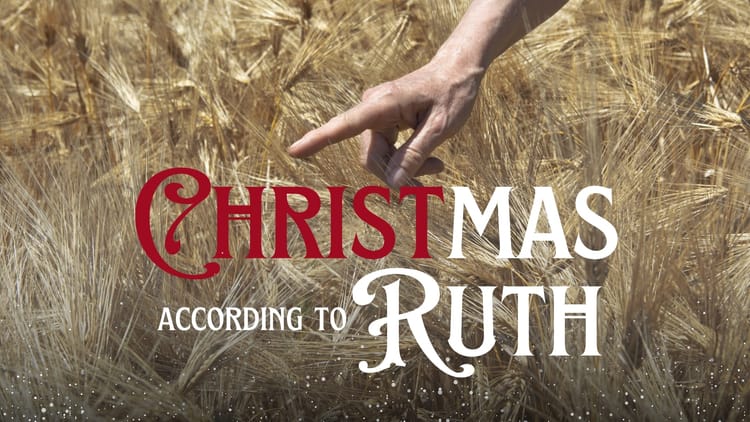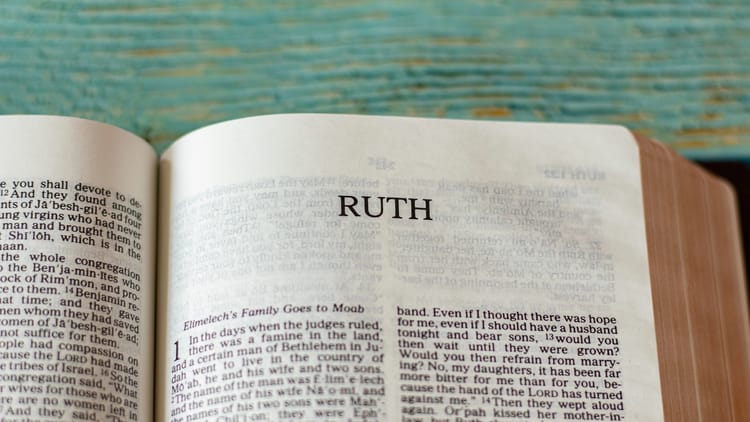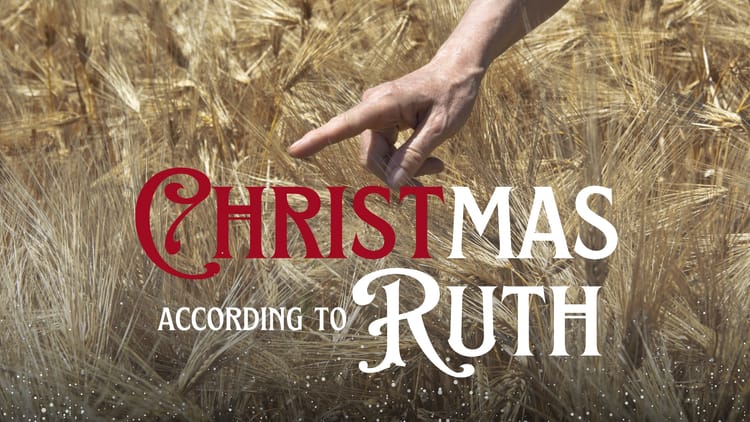God’s Answer to Our Needs (Ruth 2)

Big Idea: In anxious times, count on God’s people and God’s providence.
We live in a tough world, and many things seem beyond our control. The future looks uncertain. Do we have what it takes to not just survive but thrive? In a world that feels stacked against us, what will our lives become? Will we get the jobs we need? Will we meet the right people? Will our needs be met? How secure is our future?
It's easy to feel like life is out of control. This uncertainty can quickly lead to overwhelming anxiety because we're unsure if life will turn out the way we hope.
This is why we need the book of Ruth.
Introducing Ruth
Two weeks ago, we started exploring the story of Ruth. This story happened during the time of the judges, a tough period for Israel. Naomi went to Moab with her husband and two sons, seeking food and better opportunities. They spent 10 years there, but everything fell apart for Naomi. Her husband died first. Then, her sons married Moabite women, breaking God's law, and later both sons died. Naomi was left in a foreign land with only her two widowed daughters-in-law.
Widows had no rights back then. When Naomi returned to Bethlehem, she felt utterly hopeless. She came back with one daughter-in-law, Ruth, feeling abandoned by God. Naomi had faced famine, displacement, and the loss of loved ones. By the end of chapter 1, she was completely devastated and out of resources. At the end of chapter 1, you’re left wondering: could there be any hope for someone like Naomi?
Everything was against her and her daughter-in-law Ruth:
- They were widows in a patriarchal society where women relied on male relatives for provision and protection. Losing their husbands left them vulnerable.
- They were poor. They had no home or means of income and had to rely on the charity of others.
- Naomi was an older woman with no hope of remarrying or having more children to support her in old age. She felt the tragedy of losing her husband and two sons very deeply.
- Ruth was a foreigner from Moab, a nation with which Israel had a history of conflict. She faced potential prejudice and exclusion as an outsider trying to integrate into Judean society.
- As women journeying alone, they were vulnerable to abuse, exploitation or attack.
- Naomi was also dependent on Ruth's efforts to gather grain for their daily bread.
As widows, poor women, foreigners (in Ruth's case), and unprotected females in that day, the odds were stacked against them. There was very little reason for them to hope.
Our Hope in Anxious Times
Again, when life is out of control, when we’re in desperate need and unsure of the future, what is our hope? What will prevent us from spiraling into paralyzing fear and anxiety?
Ruth chapter 2 offers two key answers. When we’re in desperate need, and we have no assurance about the future, what can we count on? Two things. Here’s the first:
We can count on help from God’s people.
Naomi and Ruth are back in Bethlehem, and they’re hungry and desperate. But Naomi had a plan.
Now Naomi had a relative of her husband’s, a worthy man of the clan of Elimelech, whose name was Boaz. And Ruth the Moabite said to Naomi, “Let me go to the field and glean among the ears of grain after him in whose sight I shall find favor.” And she said to her, “Go, my daughter.” (Ruth 2:1-2)
Here’s some background to what’s going on in this passage.
God cares for the poor, so much so that in Leviticus 19:9-10, God’s law told landowners not to harvest their fields completely. They had to leave some crops behind for the needy and sojourners. This resembled an early welfare program. The poor could gather leftover crops after the main harvest.
This work was tough, often done in hot weather, and not always safe. Not all landowners followed this law, making it risky, especially for a foreign woman like Ruth from Moab. She had no connections or protection. Ruth went out to glean, putting herself at risk, in hopes of finding a kind, God-fearing landowner who would help the poor as commanded by God. And there was no guarantee that she would find someone who followed God’s law, or that it would be safe.
Remember, this was a tough period in Israel's history, during the time of the Judges. For 400 years, Israel faced serious decline. God's people were struggling and seemed no better than the surrounding nations who didn't know God. It was a chaotic world, and it seemed unlikely that anyone would come to help Naomi.
But Ruth went out, and she found someone godly even in these godless times. In verse 3, she ended up in the field of a distant relative of Naomi’s. She had no reason to go to that specific field. Verse 3 says she just happened to go there.
So she set out and went and gleaned in the field after the reapers, and she happened to come to the part of the field belonging to Boaz, who was of the clan of Elimelech. (Ruth 2:3)
In Hebrew, it means "as chance chanced," or as we might say, as luck would have it. It seemed completely random and out of her control. Yet, she ended up in the right place to meet a godly man.
In verse 4, Boaz spoke to his workers. “And behold, Boaz came from Bethlehem. And he said to the reapers, ‘The LORD be with you!’ And they answered, ‘The LORD bless you.’” Often in the Bible, a person's first words reveal what they are like. Here we see that Boaz honored the Lord and was respected by his workers. It is clear right away that she just happened to find a righteous man during evil times. By seeming coincidence, she just happened to come across a godly person.
Not only that, but he noticed her and took a personal interest in her. In verses 5 to 7, he asked the foreman who she is, actually whose she is. He found out that she is the one that people have been talking about, the Moabite who came back with Naomi, who has nothing, who's been working hard all day.
But he doesn't just notice her, which is amazing enough. He extended care to her. In verse 8, he commanded her to stay in his field and instructs his workers not to harass her. He treated her so nicely that in verse 10, Naomi asked, “Why have I found favor in your eyes, that you should take notice of me, since I am a foreigner?” The answer: he’d heard about her, how she’d left her father and mother and native land and come to Israel. He then blessed her: “The LORD repay you for what you have done, and a full reward be given you by the LORD, the God of Israel, under whose wings you have come to take refuge!” (Ruth 2:12)
As if it couldn't get any better, in verses 14 to 16, he invited her to a meal. She sits beside the reapers and she gets a feast. She eats until she's satisfied and even had some leftovers.
Boaz went out of his way to protect her and care for her. He's the epitome of generosity.
By the time she got home in verses 17 and on, she was able to report to her mother-in-law that she had met one of God's people, that she’d really been cared for by somebody who not only kept God's law but has taken particular notice of her.
It's easy to get disillusioned with God's people, especially when there's so much bad news about them. It was the same in Ruth and Naomi's time. There was little reason to hope in God's people. Yet, Ruth found that God provides for us through his people. Even in tough times, God still has righteous followers. We need him to show his care through people like Boaz.
When I was growing up, my family went through a crisis. We attended a very imperfect church with many faults. If I had to choose a church to support us, I wouldn't have picked that one. But looking back, God met our needs there. Despite its flaws, the people were exactly what we needed. God provided for us in ways we couldn't imagine.
I've seen this pattern over and over. Even when the church seems untrustworthy, God brings godly people into our lives at just the right time.
When I was young and in England, I couldn't count on my dad. He was the only person I knew in Europe and wasn't trustworthy. At 12, I felt vulnerable. Yet, when I went to church, I felt confident that even though I knew no one, I had family in the church.
This is true for all of us today. One way God provides is through his people. He brings righteous individuals into our lives just when we need them.
As Christmas approaches, remember this message. By the end of the Old Testament, things looked hopeless during a 400-year period of silence from God. But then, in the Gospels of Matthew, Mark, and Luke, we find good, godly people during dark times of Roman captivity. We see Joseph, a righteous man who obeys God and cares for his wife at the cost of his reputation. We see Mary, a young and godly woman; Zechariah, John the Baptist's father; Simeon, who waited for Israel's consolation; and Anna, an elderly prophetess who worshiped day and night.
In every age, even in dark times, God has His people. Have you discovered this? Have you realized that one way God provides for you is by bringing good people into your life at just the right time?
Not only that, but you can be one of those people. You can be someone that God uses to help others who need encouragement and support. I don’t think Boaz thought he was doing anything remarkable. He was just being faithful. But God used him in the life of someone who desperately needed it.
I’ve become a big believer in how God provides for us through his people. If you are in desperate times, you need his people. We all do. His people aren’t perfect, but one of the ways that God provides for us is through ordinary, godly people. And if we’re faithful in looking for them by staying connected with God’s people, God seems to have a way of bringing just the people we need into our lives. I’ve seen that in this church over and over again.
When we’re in desperate need, and we have no assurance about the future, what can we count on? We can count on God’s people. But there’s a second thing we can count on, and it’s even better. Second:
We can count on God’s providence.
I mean everything I’ve said so far. We really do need God’s people. But if my sermon today was just about hoping in others during a crisis, it would be a very deficient sermon. Our hope must be more than that. In the book of Ruth, we see a greater hope, one that surpasses the help from others. Our ultimate hope is in God’s providence.
In times of anxiety, we can trust that God is working behind the scenes for His glory and our good. Earlier, I mentioned from verse 3 that Ruth just happened to come to the right field. This invites us to see God's hand at work. She didn’t just end up there by chance; God led her there. And in that field, there wasn’t just a godly man by accident. God had been shaping this man’s character all along.
Behind these seeming coincidences was God’s active care for Ruth, just as He cares for us. In verse 20, Naomi praises the Lord and asks Him to bless Boaz because God had not forsaken them. The kindness of Boaz was actually the Lord's kindness. It was God who provided for Ruth and Naomi and preserved Boaz for Ruth. The light of God's love broke through.
God is kind and good to everyone who takes refuge under his wings. Our ultimate hope isn’t in people’s kindness but in God’s sovereignty, providing what we need when we need it most. For those who take refuge in God, they will find exactly what they need.
God is not just in charge of our lives but all history, guiding everything to His purpose. John Piper defines God’s providence as:
…his purposeful sovereignty by which he will be completely successful in the achievement of his ultimate goal for the universe. God’s providence carries his plans into action, guides all things toward his ultimate goal, and leads to the final consummation.
Ruth is a perfect example of this. In the darkest times, when hope seems lost, He provides for us. Our hope isn’t in our health, relationships, resources, or even our church — it’s in God and what He’s doing right now amid our difficulties.
We can be confident that God is at work even in the darkest times, never abandoning His people and always working out his purpose in the world.
The best part? The story of Ruth doesn’t end with her; it leads to Jesus' birth. Ruth is part of God's plan to bring a Savior into the world.
Ruth is part of the Christmas story. Jesus came from Ruth's bloodline. The same God who worked behind the scenes in Ruth’s life was at work in bringing Jesus to this world. When Jesus was born:
- He “just happened” to be born to parents from the right lineage in fulfillment of prophecy. He “just happened” to be descended from David’s line with full legal and blood rights to the throne.
- A census “just happened” to take Mary to Bethlehem, as Micah prophesied.
- Herod "just happened" to try to kill him, as prophesied in Jeremiah.
- He “just happened” to arrive during the Roman peace (Pax Romana), when Greek was a common language, helping to facilitate gospel spread, a time when Roman roads and infrastructure facilitated gospel spread.
Galatians 4:4 says, “But when the fullness of time had come, God sent forth his Son…” God “just happened” to work out all of these details at exactly the right time, just as he continues to do today.
If God just happened to do this for Ruth, and he just happened to do this for the arrival of Jesus so that we could be saved through him, what makes you think that he won’t do this for you? The God who did all this, who sent his Son to save you, is at work in our darkest trials to accomplish his purposes.
In all his mysterious ways, God is working for the good and happiness of his people. Even in tragedies and setbacks, God is quietly working to bring about greater joy. God is at work in the worst of times, laying the foundation for greater things to come, even when we can't see it. He was preparing the way for the Messiah through the dark days of the judges.
God works through ordinary people like Ruth, Naomi, and Boaz during tough times and continues to work today when things seem darkest. Our hope is in God's active care and providence, knowing He provides exactly what we need and guides history to its ultimate end — and we get to be part of it.
In anxious times, count on God’s people and God’s providence.





